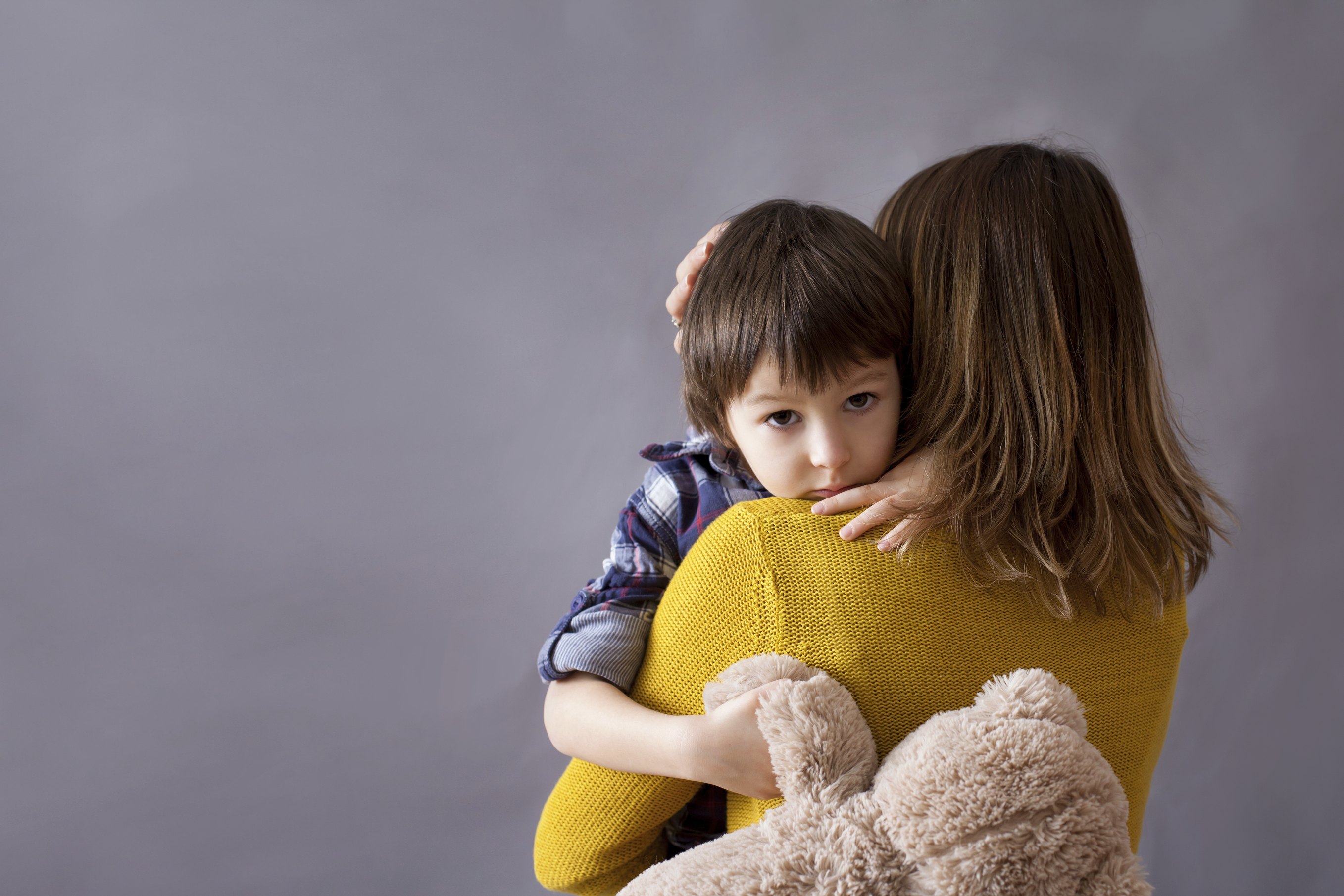
One recent evening, my 11-year-old daughter Annie and I finished reading a book together that left us both crying. Perhaps inspired by the emotional moment, Annie looked straight into my eyes and said, “I don’t like school, Mom. I would rather be with you.”
“I know,” I said. “School is hard. I miss you, too.”
The end of summer break always goes this way; Annie anticipates the new school year with anxiety strong enough to wake her in the middle of the night and send her slipping into our bed. It doesn't let up after school starts, either. This year’s first school drop-off involved no tears, but after school found Annie breathing fast as she told me “I don’t think I have any friends.”
“Oh, honey, that can’t be true,” I replied, hugging her close as the tears began to fall.
That night, she crawled into our bed again. I let her stay a few minutes before asking if she could return to her room. She said no and held on to me tighter.
When children greet school with such anxiety, it’s easy to want a three-step cure to transform fear into excitement. While an easy fix doesn’t exist, parents can still help ease anxiety, says Seattle-based parent coach Jenni Pertuset. As a Neufeld Institute course facilitator, Pertuset help parents better understand what their children need through the relational-developmental approach of Dr. Gordon Neufeld.
We discussed what exactly anxiety is and how to make the transition back to school easier.
What exactly is anxiety? How do we know if our children are feeling anxious?
Anxiety is a form of alarm, which is the emotion of feeling unsettled or unsafe. Parents often have an instinctive understanding that our kids are worried. We see it in their disrupted sleep or trouble falling asleep, in their stomachaches or headaches. We see them sucking on their shirt or biting their nails. We pick up on the signs that tell us indirectly that our children are alarmed.
Sometimes our kids can tell us outright that they feel worried or upset. That lets us know their alarm is working as it’s supposed to, identifying what feels threatening and helping to keep them safe. When they know they feel unsafe and know why, that’s pure alarm. Anxiety adds a layer, like a fog obscuring the source. In this fog, they carry around a feeling that something’s not right but they don’t know why. It’s hard to stay safe when you don’t know the reason you feel in danger.
What can we do to help? Does a common strategy — pointing out the good parts of school — ever help?
Anxiety is an emotional experience. We can’t meet it with intellect; we can only help [our kids] move through the emotion. If you can’t stop your mind from spinning, all the answers in the world about why it’s spinning won’t help. You can explain to your child why school is a safe place and try to convince them they don’t need to worry, but they are still going to worry. If we start by understanding why they’re alarmed, we can be better at helping them.
Anxiety is an emotional experience. We can’t meet it with intellect; we can only help [our kids] move through the emotion.
There’s an intuitive phrase ‘separation anxiety’ that we tend to use only when we’re talking about a young child who is physically apart from a parent. Separation is much broader, including anything that might disrupt an important relationship, and it affects us at every age.
Since the need for connection is such a basic need for children and adults alike, it’s no wonder separation can be so alarming. Being physically apart is one separation experience; so is feeling excluded, disliked, abnormal, unimportant or misunderstood. So while school anxiety might partly be about being away from a parent, it can arise from many experiences of separation.
How can we help ease our children’s anxiety about the school year?
Encourage them to trust you and know that you are equal to their confidence. Believe in yourself as a parent. You may not know exactly how to get to an easier place, but let your child know you are there and you are going to help them.
If they are talking to you about their worries, you’re starting off strong. It’s good if they’re coming to you and crying or talking about it, not because you want them to feel sad or worried, but because you want to know if they do. You can help them only if they are looking to you for help.
Lean into their feelings, give them words for their alarm and encourage their sadness. It’s not that you are trying to make your child cry, but inviting them to feel what’s already there. The more you battle a feeling or try to escape it, the more that feeling is going to run you. So don’t talk them out of feeling; be right there with them in it. [For example,] ‘It’s hard to feel like the teacher doesn’t see you.’ Make it as safe as you can for them to share their feelings with you.
Your job is also to normalize anxiety. Not only are their feelings OK, they’re totally understandable. Let them know that you get why they’d feel this way: ‘Oh honey, it’s hard to feel like they don’t like you or that you’re not like everybody else.’ You aren’t agreeing that your child is an outcast when you express empathy that she feels like one.
Shouldn’t a parent try to rationalize irrational thought? For example, shouldn’t I tell my daughter that I saw a friend say hello and that I think she does have friends?
You can give them a different perspective, but don’t try to give it at the height of their worry. When they have space from that upset, you can represent the view that they might not be able to see. Say ‘I noticed your teacher really likes to see you walk into the classroom’ so they know their teacher is on their side.
While it’s important to give them a reality check, our primary role is to show up for the emotions our children are having. It’s so easy to get exasperated by their worry and say, ‘Oh, you have friends! You don’t need to worry about that!’ The more you’re present with their feelings — ‘I’m sorry you’re worried, that’s hard’ — the more you are helping them.
Our main job is to get our kids to believe we are on their side. We are entirely for them. You don’t have to be against anyone else to be for your child. If they know they can count on you, you have the best possible context for parenting them well.
Beyond listening and validating their feelings, how can a parent ease back-to-school anxiety?
Reduce separation. By this, I don’t mean keeping them out of school and staying home with them, but recognize that they may need less time away from you when they aren’t at school.

Look for ways to reduce other forms of separation, too, to create emotional closeness with your child. Give them the sense that you are always connected to them. When my own daughter was younger, that meant filling a stuffed animal with my kisses for her to have when we were apart. Now that she’s older, I have a mental map of her day and I can give her a sense that I’m with her when she’s away. I might tell her I’ll be thinking of her at 11 when I know she’s entering the class that’s hardest for her.
Find little ways to let them know you’re hanging on to them. When you walk the dog, bring a leaf back and say, ‘This red leaf reminded me of you so I thought I’d bring it to you.’ Or, like my friend used to do, draw a small heart on your child’s forearm with a Sharpie. [Note: I used to give Annie tiny Post-It notes that she carried in her pocket.] Read books together like The Kissing Hand and The Invisible String. These books show the parent-child connection never breaks. This connection outlasts everything; they can go to the moon and back and this connection will still be there.
As your child becomes more mature, there’s a piece of this anxiety and separation puzzle that’s about really connecting with who they are. Draw out from them what they care about and think about. They’ll have a deeper connection to you and stronger sense of themselves, and both will help them feel more secure.
The most important part of easing their anxiety is being an inviting place for their sadness and all that doesn’t go right for them, from not having anyone to play on the playground with to missing the carefree nature of summer.
Wouldn’t our worlds all be so much better if we all had someone who could just hear us? Kids and adults alike don’t want to feel like we are carrying our burdens alone. Just be on their side and hear them.
More from parent coach Jenni Pertuset
For an in-depth exploration of anxiety and further solutions for reducing it in your child, get on the waitlist for Jenni Pertuset’s next anxiety class at Fufilling Parenthood. If your own anxiety is keeping you from being as steady as your best parenting requires, Pertuset also offers an “Ease Your Anxiety” workshop, starting Nov. 2.











